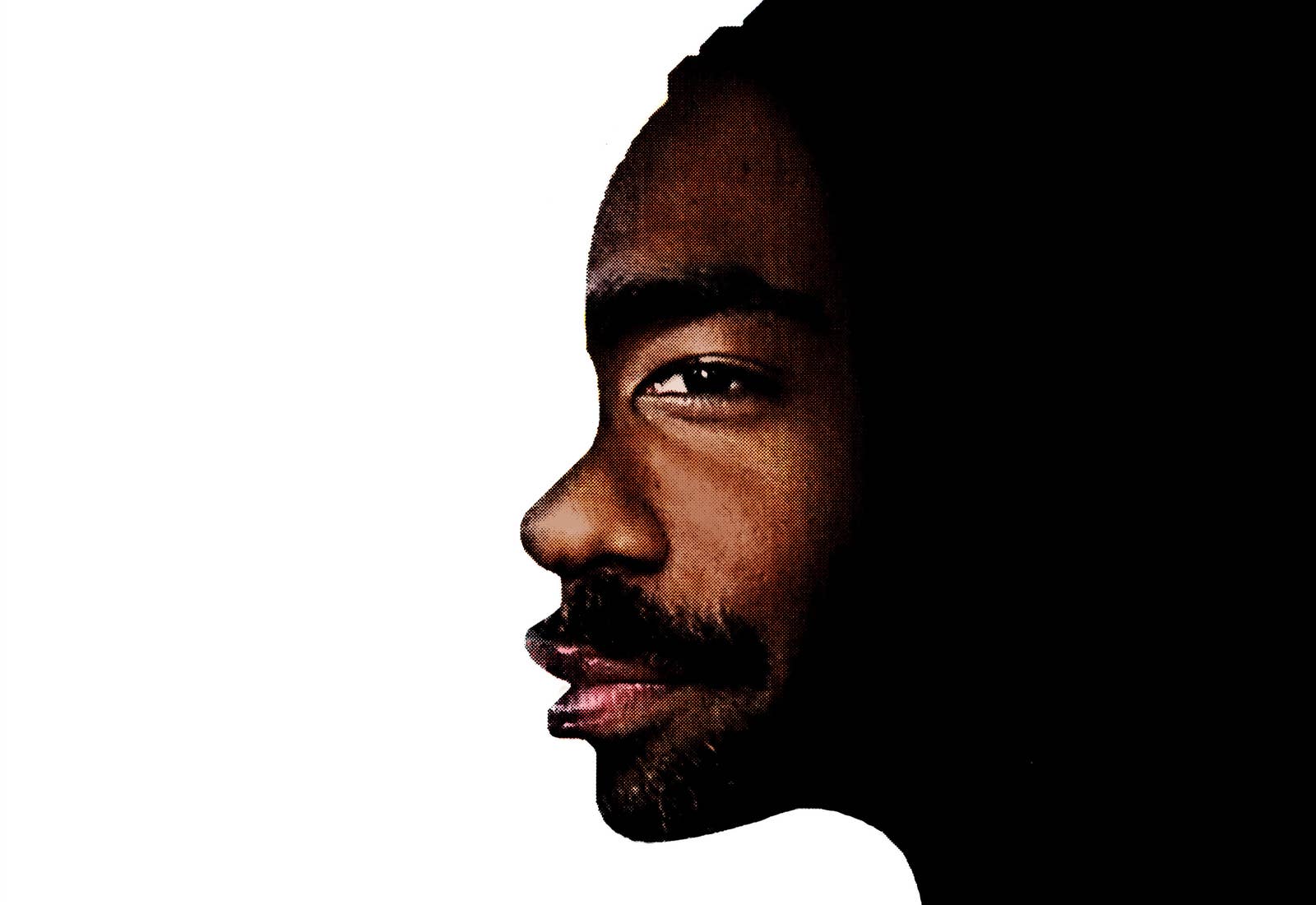
In the fourth episode of Atlanta’s final season, “Light Skinned-ed,” the women in Earn’s (Donald Glover) family are wrestling for access to his grandfather — who is dealing with symptoms resembling dementia — but they can’t stop getting in each other’s way. Earn’s aunt Jeanie — conniving, unrelenting, and prone to histrionics — gatekeeps access to Earn’s grandfather from the rest of the family, treasuring her role as caretaker. Earn’s mother Gloria schemes to spend the day with her father while the family is at church, but Jeanie declares a family emergency, claiming that Gloria has “kidnapped” their father. No one can proceed with their day until her impetuous needs are addressed, including her celebrity nephew, rapper Paper Boi (Brian Tyree Henry), whose studio session she interrupts without so much as an apology.
Jeanie orchestrates a conference between all of the siblings and then lists her perceived grievances and slights. She cuts Gloria down to size: “Daddy got kids all over Georgia and he can remember most of them, but never little Gloria,” she says, “and now that he’s dying, you can’t even talk to him, because he don’t even know who you are.” Her voice drops down to a quiver: “Y’all have always hated me ever since we were kids … because I’m light-skinned!” Her siblings immediately rebuff and ridicule her, especially her darker-skinned sister Pearl, who says, “I bet you won’t be complaining about being light-skinned-ed if the cops came down there.” Jeanie interprets the rejoinder as a challenge, calling law enforcement to demand a welfare check on her sister and father. Later she demands that both her nephews be arrested for not assisting her efforts.
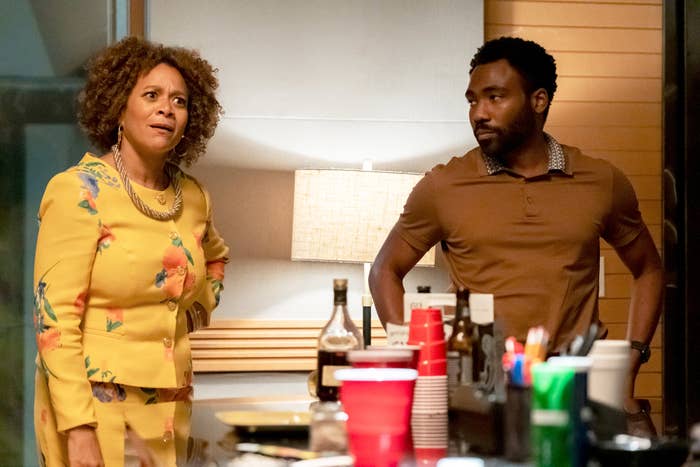
This episode, particularly this sequence of scenes, is emblematic of a particular shortcoming that has plagued Atlanta since it debuted to widespread critical acclaim in 2016. Among all the sharp, authentic depictions that have made the series so beloved, many of the characterizations of Black women remain superficial, slipshod, and rife with stereotypes. Jeanie’s behavior is a caricaturish representation of the violence of colorism and how that harm often gets minimized. There’s little explanation as to why the family enables her behavior and why she is forgiven for such an egregious violation of trust as calling the police on another Black person, much less unleashing unresolved traumas. She appears ludicrously cruel, a maximalist rendition of the Sapphire trope: inexplicably hostile, combative, and alienating.
She appears ludicrously cruel, a maximalist rendition of the Sapphire trope: inexplicably hostile, combative, and alienating.
Glover’s depictions of Black women are a continued failure point for him, even though he has been lauded as an auteur of Black entertainment. Take “The Big Payback,” a stand-alone episode from Atlanta’s more speculative and cerebral third season. A Black woman named Sheniqua Johnson (Melissa Youngblood) demands reparations from the white male lead, Marshall Johnson (Justin Bartha), after she does some research and discovers that his ancestors once enslaved her ancestors. Sheniqua accosts Marshall with her livestreaming phone outside his house, claiming it as her own, and goes to his job with a bullhorn to humiliate him into acknowledging his debts in a public square. “Could you please just leave me alone?” he pleads. “That’s exactly what my great-great-grandmother said,” Sheniqua sneers in response before clicking the bullhorn back on to continue to spread the word of the Johnson family’s sins.
It takes the musings of a white stranger whom Marshall meets in the lobby to add rhyme and reason to Sheniqua’s vocal frustrations. “We were treating history as if it were a mystery in the past, something to investigate if we chose to,” the stranger says to Marshall. “To Sheniqua, to them, slavery is not past. … It is a cruel, unavoidable ghost that haunts in a way we can’t see.” The conversation seems to help prompt Marshall toward offering some form of reparation, but Sheniqua never vocalizes those nuances herself. The only hints of her personality and circumstances come when Marshall scrolls through her Instagram profile in a hotel bar, newly shamed over how he’s minimized the impact of white supremacy in America. Whatever interpersonal resolutions and negotiations that occur between Sheniqua and Marshall to appease her frustrations and move forward take place offscreen, leaving a closing scene where Marshall now gets his check garnished for restitution in his new job as a waiter. But viewers only ever see a bombastic Black woman, considered by the white characters as a disruption who needed to be mollified.
Glover seems to be aware of his uneasy relationship with Black women in his work. In April, he conducted a bafflingly meta self-interview for Interview magazine and deflected a question that has clearly vexed him, instead offering an answer that was frustratingly noncommittal:
Are you afraid of Black women?
Why are you asking me that?
I feel like your relationship to them has played a big part in your narrative.
I feel like you’re using Black women to question my Blackness.
Predictably, some Black Twitter users didn’t respond kindly to Glover’s evasive tone, feeling that Glover mainly used the topic as a needless provocation. “Donald Glover has made it pretty clear that he doesn’t really rock with Just Reglass Black American Women.™ Not REALLY socially, and certainly not romantically. Which is his prerogative,” writer and originator of the #YourSlipIsShowing hashtag Shafiqah Hudson tweeted around the time the interview went live. “What bothers ME and a LOT of women like me is the pathological inability of Black men like Glover to just leave us thee fuck alone.”
In fairness, some people have used the fact that Glover is in an interracial relationship to question his commitment to Black art. After Glover’s “This Is America” music video came out back in 2018, Dr. Umar Johnson, the controversial pan-Africanist and internet talking head, tweeted: “Childish Gambino’s video contained powerful metaphors but once the contradiction of a White Queen [referring to Glover’s nonBlack partner] surfaced it diluted his message.” And during a 2018 press junket interview for Solo: A Star Wars Story, a journalist asked Glover: “If you love someone different from who you are, can you still be conscious to your core people?” At the time, Glover responded, “I feel like you can totally love somebody and still look out for yourself. But I think the question really is, do you see that someone else as a part of you?”
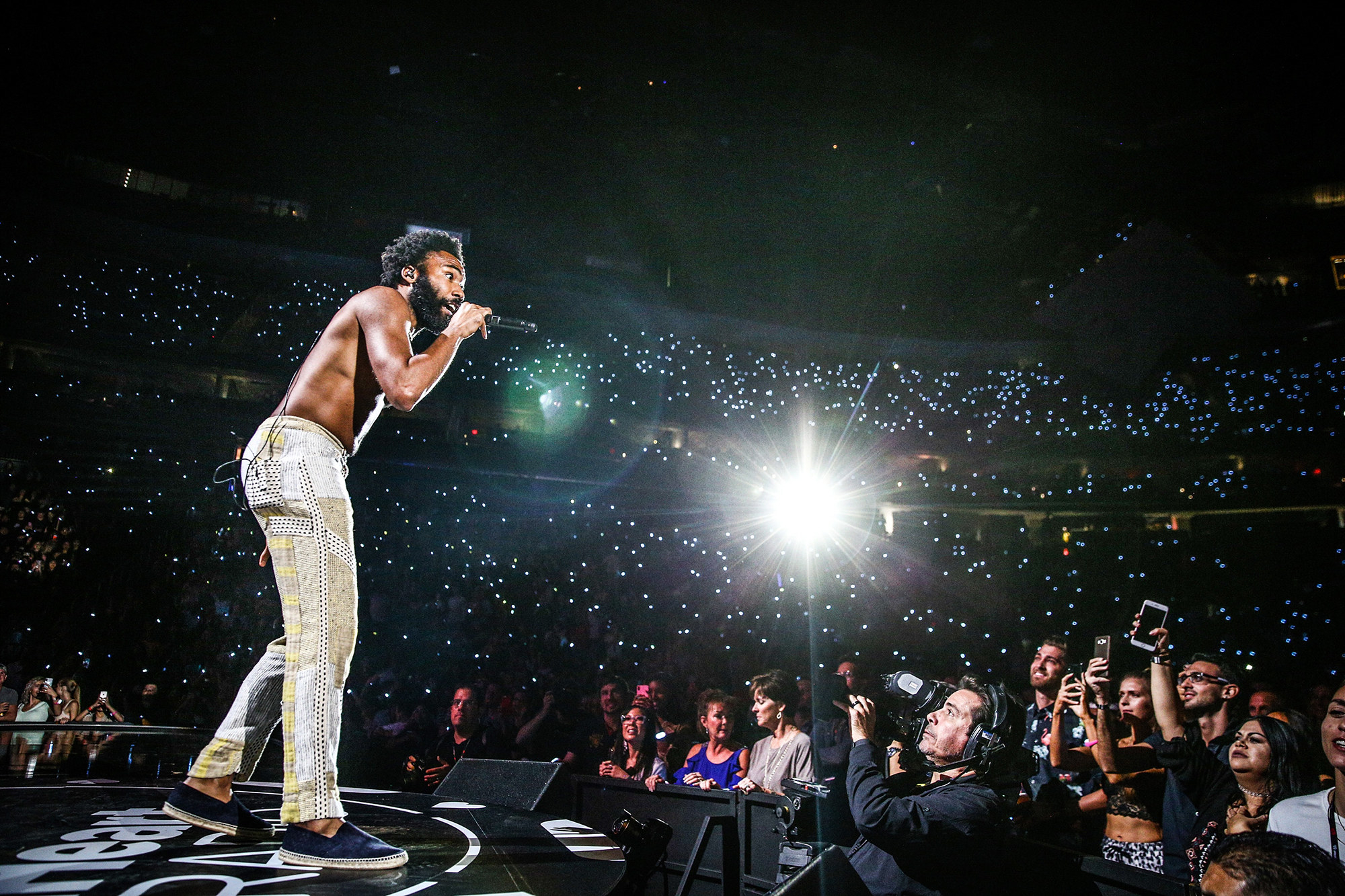
In his Interview self-interrogation, Glover mentioned that he disagreed with Johnson’s view before segueing into his pointedly vague remarks about Black women. But in framing the dialogue accordingly, Glover implied that the animus some Black women seem to have toward him has to do with his real-life interracial relationship and not the limiting depictions of Black women in his work.
When Glover does address Atlanta’s treatment of Black women, it’s with sneering irreverence. The description for “Rich Nigga, Poor Wigga,” the ninth episode in Atlanta’s third season, reads: “Black and White episode? Yawn. Emmy Bait. Why do they hate black women so much??” It’s a taunt, not a real question, because Glover has chosen to view valid criticisms as hyperbolic theatrics not worth a response.
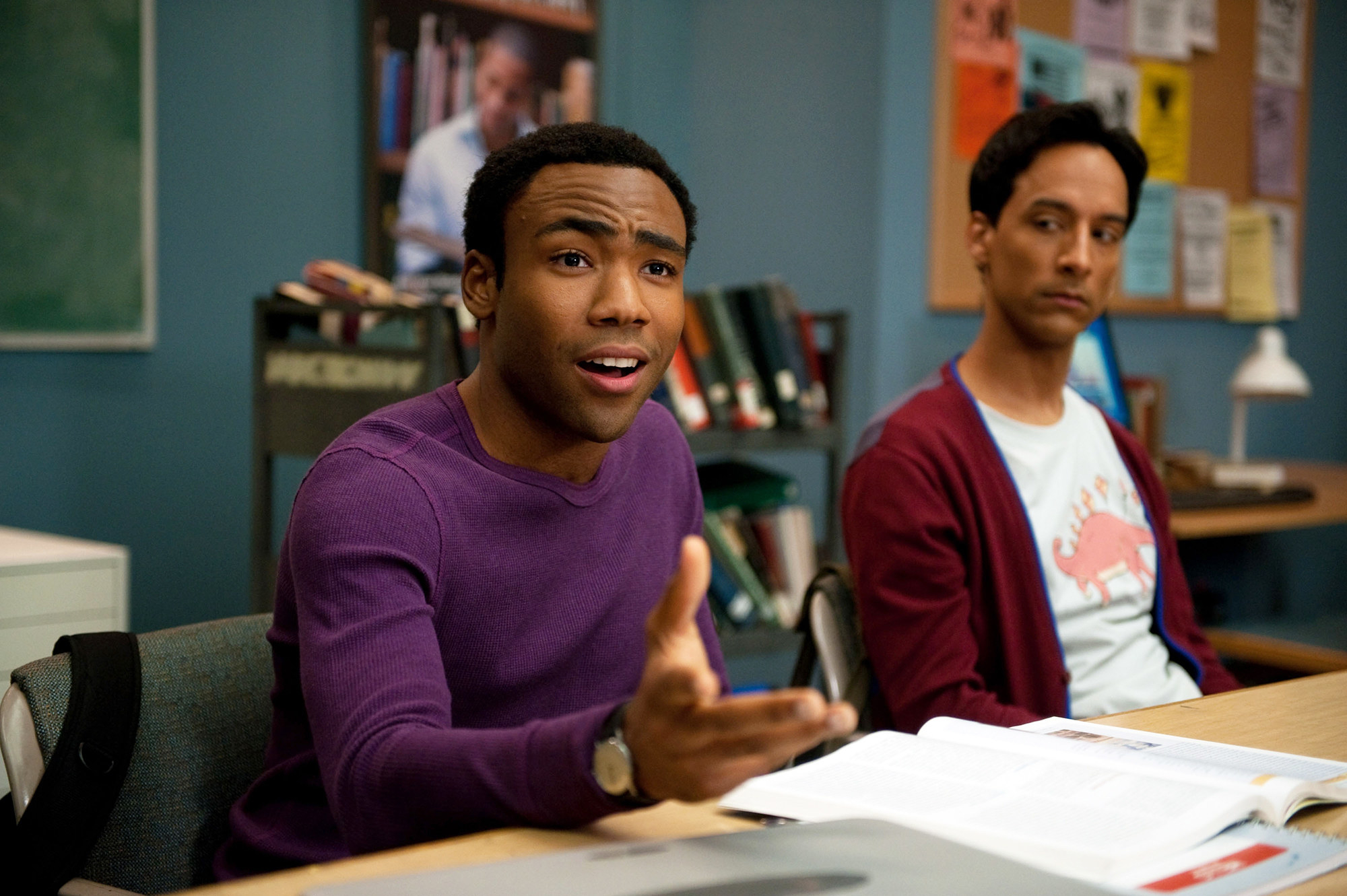
Before Atlanta’s rapturous reception, Donald Glover had gotten really good at playing the Black best friend. He was the young guy known for the viral 2006 frat-bro sketch comedy bit “Bro Rape,” a popped-collar, homoerotic parody of NBC’s true crime series To Catch a Predator. He played Troy Barnes, one half of a Bert and Ernie–style duo with best friend Abed on NBC’s cult-favorite comedy Community. He talked about being a Black nerd in his stand-up comedy and had started releasing hip-hop albums as Childish Gambino — a name he derived from a Wu-Tang name generator.
In an interview just before Atlanta premiered, Glover appeared aware that his work had caused conflicting responses among Black people. “I know when I go to Baltimore, when I go to D.C., it’s like 50-50 — half of them are like, ‘I love this dude, this dude’s cool.’ And the other half are like, ‘This coon-ass dude,’” Glover told writer Rembert Browne in a 2016 Vulture interview. “The actor can sometimes seem moody or like he has a chip on his shoulder,” Browne writes. “Because, to some degree, he does.”
When Atlanta premiered, the response must have served as vindication. Atlanta’s first season was an undeniable hit, and in 2017 Glover became the first Black person to receive an Emmy for Outstanding Director in a Comedy Series (in addition to the one he received for Outstanding Lead Actor in a Comedy Series). A 2018 New Yorker profile featured gushing quotes from Chris Rock and writer-director Ryan Coogler: “He can push the envelope in all these different areas and it’s not that difficult for him.” In the same interview, Jordan Peele claims: “For black people, ‘Atlanta’ provides the catharsis of ‘Finally, some elevated black shit.’”
Elevation, apparently, does not require substantive renderings of Black women. The character of Van (Zazie Beetz) exemplifies this. She has been tragically stagnant, underserved, and underdeveloped over the show’s four seasons, functioning as a plot device when her character arc is explored at all. In the first season, she’s originally a teacher and a grounding force in Earn’s life. In Season 2, she’s a convenient foil for a conversation about desirability in the bottle episode “Champagne Papi.” Her darker-skinned friend goes on a bitter rant about interracial house party with her Black partner. “There are plenty of good Black women, but you don’t see Brad Pitt trying to date Shonda Rhimes,” she seethes, in response to the white woman who sheepishly says “maybe I’m just a good girlfriend.” “Type ‘beautiful woman’ in Google Images, honey. Then you can talk to me.” Black women are always wrestling with untenable resentment in Donald Glover’s universe.
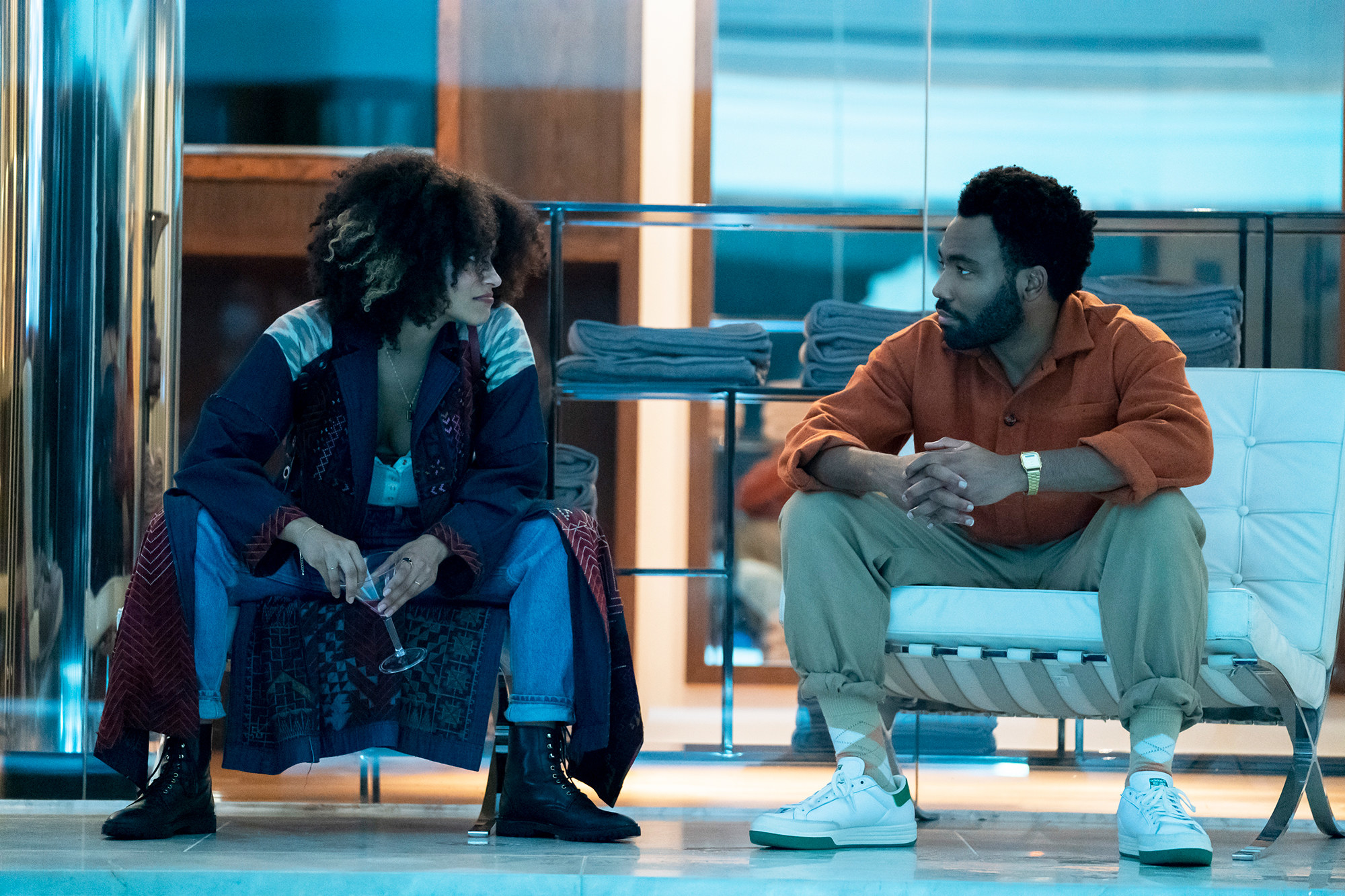
At the end of Season 3, Van has a nervous breakdown triggered by increasingly feeling invisible as an aimless single mother, but her identity crisis seems to be a baffling way to address her negligible appearances in earlier episodes.
In an interview with the Wrap, Beetz posited that in Season 1, Van is defined by being a breadwinner and early motherhood, and in Season 2 by her desire to experience love outside of her life as a mom. “In Season 3,” she says, “she decides to take that identity of ‘I am a person first and what does that mean for me?’” Despite the season finale being dedicated to Van’s anxieties spilling over, this question does not get properly or meaningfully interrogated.
The current and final season resumes with Van in just as ambiguous a space. The episode “Work Ethic!” explores the relationship between Van, who is now randomly and without much explanation trying her hand as an actor, and her daughter Lottie through the lens of a discussion of “good” versus “bad” Black art loosely influenced by Tyler Perry.
These critiques about Black women on the show aren’t novel; they are just ones that Glover — both Donald and his brother Stephen, who also writes on the series — continues to resist.
What starts as a frivolous venture for Van to make some money as a guest actor quickly transforms into Van fighting to protect her daughter from the exploitative clutches of a studio run by “Mr. Chocolate.” He Personal assistants shuttle Lottie around various sets, having her play the daughter of a mother who has a crack addiction and is in an emotionally abusive marriage. “You just make unrelatable shit that takes advantage of the people you say you’re trying to help,” Van asserts. It is arguably the most engaged Van’s character has been with various anchoring dynamics of the series — her daughter and the city — yet it ends up feeling very dated, largely because the episode and its positions were originally crafted years before the pandemic. Her sudden and unexpected foray into acting, which is introduced for the first time in the episode, also marks a complete devolution of Van’s characterization. She originally served as a stabilizing force and main provider in her relationship with Earn and has become one of the most aimless figures on the show, with no real grasp of her ambitions and desires.
The most emotionally layered and poignant episode of the season so far, “Snipe Hunt,” feels unearned. Van and Earn go camping as a family for their daughter’s birthday, while reconciling and making plans to move to Los Angeles together. But there hasn’t been enough investment in Van as a character or her shifting relationship with Earn to imbue the decision with the implied weightiness.
Stefani Robinson, one of now two Black women writers on Atlanta, has previously spoken about the pressures of being a Black woman in the writers room of a show that becomes such a lightning rod for Black cultural discussion. “I just see my name get thrown around, like, ‘Well she’s the only one, so she’s responsible. Is that how she thinks of all women?’ I become the lightning rod for the females’ perspective,” she said in a 2018 interview with the Wrap. “It’s such a hard place to be in and, I think, not a fair place to be in. There need to be more women everywhere, to be honest.”
These critiques about Black women on the show aren’t novel; they are just ones that Glover — both Donald and his brother Stephen, who also writes on the series — continues to resist. In a recent Deadline interview, Donald said, “To be like, ‘Oh, these Black people hate Black people or these Black people hate Black women’ — I’m like, It’s such … a small view of who we are. I feel like it might even be because of what we’ve been through that you look at us the way you look at us.”
As in his previous responses to such questions, he suggests that the fault is with the viewer and critic, who has not understood his work or his community correctly; he assumes that they are thinly veiled personal vendettas. But he fails to accept that such comments stem from the particular ways that the show Atlanta presents Black women. Instead, he insists, “the conversation isn’t as elevated as it should be.”
Atlanta’s season finale is tonight, which doesn’t leave much room to address many of these gaps. What we can best hope for is a satisfying acknowledgement of Van’s changing trajectory. It would also be nice to see some characterization that goes beyond her relationship with Earn and suggests a path to fulfillment that exists beyond the melancholy, ambiguous state of her life as a partner and mother. Glover’s skill as a creator is more than evident, which is what makes his inability to provide fleshed-out characterization and narrative arcs with Black women characters so frustrating. That his response to these criticisms is to deflect and evade is a choice and a political statement, more so than any partner he has chosen romantically. Glover does not owe Black women anything, but what they do not deserve is antagonism. Black women on the internet or in real life are not villains for inquiring and demanding more, whether or not you agree with them. ●
